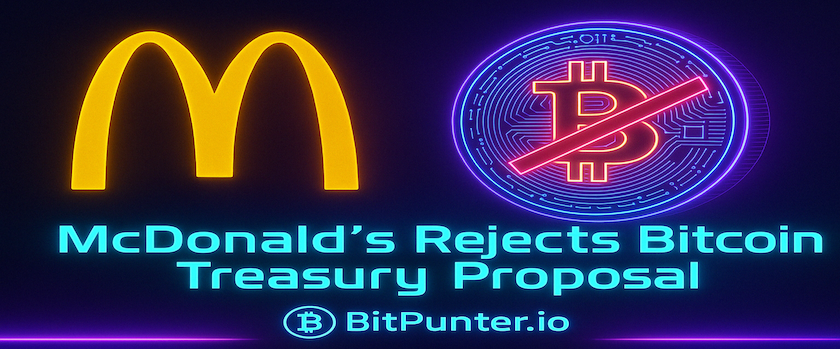🍔 McDonald’s Rejects Bitcoin Treasury Proposal
McDonald’s has shut down a shareholder push to adopt Bitcoin as a treasury asset, with the SEC backing its decision to keep crypto off the agenda.
 🍔 McDonald’s Declines Bitcoin Treasury Proposal Backed by SEC
🍔 McDonald’s Declines Bitcoin Treasury Proposal Backed by SEC
McDonald’s has successfully avoided engaging with a shareholder’s Bitcoin treasury proposal, marking another setback for cryptocurrency advocates pushing for mainstream corporate adoption. The U.S. Securities and Exchange Commission (SEC) has given the fast food giant the green light to omit the proposal from its 2025 annual shareholders’ meeting, emphasizing that such a move falls under ordinary business operations — not something shareholders can mandate.
📜 Bitcoin Treasury Proposal from NCPPR Gets Shut Down
The Bitcoin treasury proposal came from the National Center for Public Policy Research (NCPPR), a Washington, D.C.-based shareholder known for pushing crypto-friendly agendas across major U.S. corporations. This year, they asked McDonald’s to consider holding Bitcoin in its treasury — a move inspired by companies like MicroStrategy, now renamed “Strategy,” which saw explosive stock growth after embracing the cryptocurrency.
📉 Strategy vs. McDonald’s: A Tale of Two Treasuries
According to the NCPPR, Strategy’s stock has outpaced McDonald’s by 2,360% over the past 60 months, all thanks to their bold Bitcoin treasury proposal. The group framed its suggestion as a way for McDonald’s to hedge against inflation and preserve value beyond just operational profitability. Still, McDonald’s wasn’t convinced this approach fit their strategy.
⚖️ SEC Sides with McDonald’s on Business Autonomy
In a formal letter to the SEC, McDonald’s legal team argued that the Bitcoin treasury proposal relates to internal investment strategies — something traditionally left to the board’s discretion. The SEC agreed. “There appears to be some basis for your view,” the agency responded in March, indicating no enforcement action would follow if the proposal was excluded from the upcoming meeting.
📦 Amazon Faced Similar Bitcoin Push from NCPPR
McDonald’s isn’t the first tech or retail powerhouse targeted with a Bitcoin treasury proposal. Last December, the NCPPR also urged Amazon to allocate 5% of its cash reserves into Bitcoin. They argued that despite its volatility, the cryptocurrency could offer long-term value — much like Amazon’s own volatile early years.
💼 Microsoft Said No to Bitcoin Too
The NCPPR’s efforts aren’t new, and the outcomes have largely been the same. Microsoft shareholders rejected a similar Bitcoin treasury proposal in late 2024. The company stated that its need for financial stability and liquidity outweighs the potential upsides of Bitcoin’s price movements. They also pointed out the regulatory uncertainty surrounding crypto as a further reason for restraint.
🏦 Corporate Resistance to Crypto Holdings Remains Strong
Despite growing institutional interest in cryptocurrencies, Bitcoin treasury proposals remain rare in the boardrooms of top global companies. The McDonald’s case shows how traditional corporations continue to view crypto holdings as speculative rather than strategic. This trend suggests that shareholder activism alone may not be enough to shift treasury policies in favor of Bitcoin anytime soon.
📊 Bitcoin Proponents Face Uphill Battle
While MicroStrategy’s stock performance has been celebrated by Bitcoin supporters, not every company is willing to take the plunge. Most are still risk-averse, preferring dollar reserves and traditional assets to crypto exposure. The SEC’s backing of McDonald’s rejection reinforces the idea that boards, not shareholders, have the final say on such decisions.
🔁 What’s Next for Bitcoin Corporate Adoption?
As Bitcoin continues gaining traction as a store of value in some sectors, more shareholder groups may push for its adoption in corporate treasuries. However, the outcome of McDonald’s Bitcoin treasury proposal — and similar ones at Amazon and Microsoft — suggests that success will be rare without executive-level buy-in.
📢 Final Thoughts
The SEC’s stance on the Bitcoin treasury proposal reflects a cautious but consistent regulatory approach: keeping investment decisions in the hands of corporate leaders while avoiding pressure from external activists. For now, it looks like Big Mac will stay Bitcoin-free — and the fast food giant will keep its treasury stacked with something other than digital gold.




















